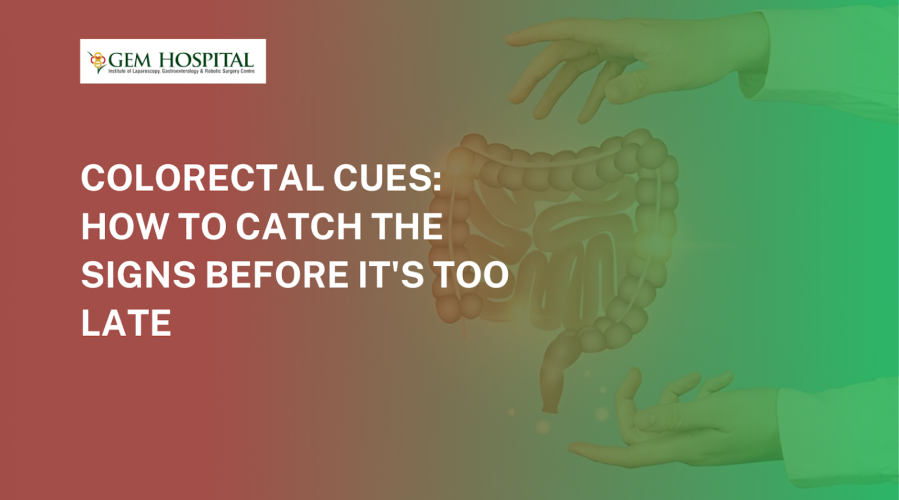Consult experienced hernia doctors in Chennai for expert surgical care. Advanced diagnosis, safe hernia surgery, and faster recovery with specialized treatment.
Colorectal Cues: How to Catch the Signs Before It's Too Late

When it comes to cancer, timing can mean life or death. Colorectal cancer (or cancer of the colon or rectum) is the third most common cancer in the world, and one of the most preventable and treatable when caught early. Unfortunately, the early warning signs are often ignored or misinterpreted. So understanding Colorectal Cancer Symptoms is not only medical advice, it may save your life.
This blog dives into the subtle signs your body may be giving you, and; when you should seek help. Because in colorectal cancer, knowing the signs before it is too late, can make all the difference.
Why Colorectal Cancer is Often Missed
Colorectal cancer usually develops slowly. Colorectal cancer begins as small, benign polyps in the lining of the colon or rectum. Over time, some of those polyps can become cancerous, but unfortunately these early polyps, usually, do not cause distressing symptoms.
By the time someone develops any notable symptoms, the cancer may be at a more serious stage. This is why awareness and co-ordinated examinations screening for colorectal cancer is vital - particularly for people 45 years or older, and anyone with a family history of colorectal disease.
The Early Warning Signs: Know the Red Flags
Recognizing the Colorectal Cancer Symptoms early is crucial. Here are the most common warning signs:
1. Persistent Changes in Bowel Habits
A sudden change in bowel habits (diarrhea, constipation, narrowing of stool) that persists for more than a few days could be more than a result of a dietary upset.
2. Rectal Bleeding or Blood in Stool
This can be one of the scariest symptoms of colorectal cancer and one of the most commonly ignored by patients. Blood in stool, even in small amounts, bright red or dark and tarry blood, should always be discussed with a physician. Patients assume it is from hemorrhoids and do not push for further investigation with persistent bleeding.
3. Abdominal Discomfort
Anxiety, cramping, bloating or muscle spasms could indicate the initiation of something worse happening down inside the digestive tract.
4. A Feeling That the Bowel Doesn’t Empty Completely
If you feel like something is “stuck” or cannot move anything else out, it could be due to a tumor that is obstructing the colon.
5. Unexplained Weight Loss
Weight loss that occurs without any alteration in eating habits or exercise could also be an early symptom of colorectal cancer or any number of other cancers.
6. Fatigue and Weakness
Internal bleeding may cause iron-deficiency anemia when you do not eat appropriately for an extended period of time. This, then, would lead to severe fatigue and weakness.
Risk Factors You Shouldn’t Ignore
While anyone can develop colorectal cancer, some factors increase your risk:
- Age: People over 45 are more likely to develop it.
- Family History: A parent or sibling with colorectal cancer increases your chances.
- Inflammatory Bowel Diseases: Such as Crohn’s disease or ulcerative colitis.
- Diet: High in red or processed meat, low in fiber.
- Lifestyle: Smoking, alcohol consumption, obesity, and a sedentary lifestyle.
Even if you don’t fall into these categories, it's still important to be aware of Colorectal Cancer Symptoms and to get screened regularly.
Don’t Wait for Symptoms Get Screened
Regular screening is the best way to prevent colorectal cancer. In addition to identifying cancer, a colonoscopy can get rid of precancerous polyps at the same time. There are also other options including non-invasive tests like a fecal occult blood test or stool DNA test.
For those who do not have symptoms or risk factors, most screening begins at age 45. If you have a family history or risk factors, your doctor may recommend earlier screening.
Men vs. Women: Is There a Difference in Symptoms?
Colorectal cancer is not sex specific, but research indicates that men may have a slightly higher likelihood of developing it. The symptoms are generally similar between men and women, though. The important aspect here is that anyone and everyone should take these symptoms seriously and get screened.
The Role of Lifestyle in Prevention
While some risk factors are beyond control, lifestyle choices play a significant role in preventing colorectal cancer. Simple changes like:
- Eating a diet rich in fiber, fruits, and vegetables
- Limiting red and processed meat intake
- Staying physically active
- Maintaining a healthy weight
- Quitting smoking
- Reducing alcohol consumption
When to See a Doctor
If you experience any of the above symptoms for MORE THAN 1 WEEK do not wait. Even if you have a minor matter, early detection is always better no matter what.
Don’t Delay Your Gut May Be Telling You Something
Colorectal cancer is one of the few cancers that can be detected early, and in many cases, prevented altogether with proactive health checks. Knowing what Colorectal Cancer Symptoms are gives you the power to act early, ask the right questions, and improve your health status.
At GEM Hospital, our focus is advanced colorectal screenings, diagnostics, and treatments with a multidisciplinary team of experts. Whether you are having symptoms or looking simply for peace of mind, we can assist you with our specialists.
Book your consultation today and take control of your health - it is not just about treating a disease, it is about preventing it before it starts.
Blogs & Article
Get advanced liver transplant treatment in Chennai with expert surgeons, modern technology, and comprehensive care for safe and successful outcomes.
Get advanced piles treatment in Erode with expert doctors. Safe procedures, modern technology, and effective care for fast relief and recovery.


